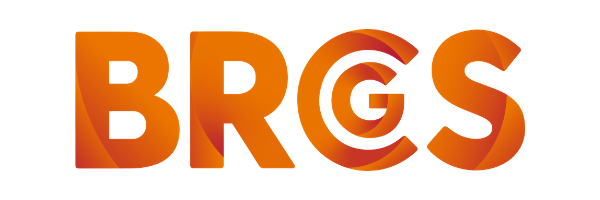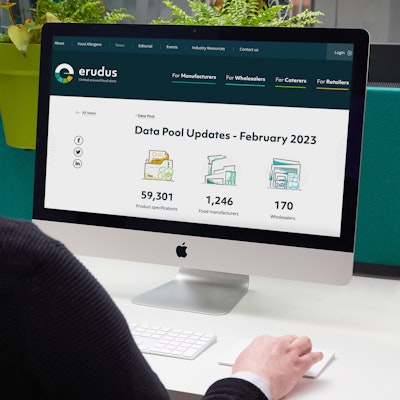Erudus… Showcases BRCGS Certification

In this new series we’re deep diving into the individual certifications you can showcase on product specifications, starting with BRC.
Erudus isn’t just a data platform - it’s an enriched data platform, with over 200 specifications for each product.
One of these attributes is certifications, so users can see which industry certifications a user. And in this new series we’re exploring the range of certifications you can add to an your Erudus account, and what they mean.
First up, BRCGS.
What does BRCGS stand for?
BRCGS stands for British Retail Consortium Global Standards. The brand was originally BRC - British Retail Consortium, but extended to BRCGS to incorporate a common industry name for the global standards BRC uses.

What is BRCGS?
BRCGS is a global brand used by over 29,000 suppliers in more than 130 countries, and helps build confidence in the supply chain through global food safety standards. It was founded in 1996 by retailers who wanted to harmonise these food safety standards throughout the supply chain and is internationally recognized today as one of the most rigorous third party certification schemes across food and non food categories. BRCGS set the benchmark for best practice manufacturing and provide proof that products and services are high quality, legal and safe.
What do BRCGS do?
BRCGS create and implement benchmark standards in a variety of sectors where Manufacturers can gain certifications:
-
Food safety: This standard focuses on encouraging development of product safety culture, expanding requirements for environmental monitoring, encouraging sites to develop systems for security and food defence, adding clarity to high-risk, high care and ambient high care production risk zone requirements, providing greater clarity for sites manufacturing pet food and ensuring global applicability and benchmarking to the global food safety initiative (GFSI).
-
Packaging and Packaging Materials: This standard focuses on meeting the needs of Retailers and brand owners to reduce the audit burden, better recognition of the diversity of the packaging industry and its customer demands, encouraging transparency and traceability in the supply chain, encouraging adoption of the standard as a means of improving product safety at small sites and facilities where processes are still in development.
-
Storage and distribution: This reflects best practice and facilitates a process of continual improvement through well-designed risk based product safety management systems and ensures the quality and safety of products during their storage and distribution through the supply chain.
-
Consumer products: This standard focuses on the importance of management commitment, product risk assessments that ensure a product’s design is safe and legal before production, processes risk assessments as a tool to ensure potential issues in the production of products have been understood, prioritised and effectively managed, the design and maintenance of the factory and production environment to ensure it’s suitable to manufacture and protected from contamination and an effective product testing and sampling process.
-
Agents and Brokers: Agents and Brokers (non-manufacturing traders) who buy, sell or facilitate the trade of products, provide a critical link in the movement and trade of products, and influence supplier product safety and quality standards, as well as being responsible for maintaining an effective chain of traceability. The Global Standard for Agents and Brokers has been developed to provide a framework for managing product safety, quality and legality for these non-manufacturing businesses in the food and packaging industries.
-
Retail: This standard is designed to promote best practice on product safety, quality and the operational criteria required to fulfil obligations with regard to legal compliance and consumer protection.
-
Gluten-Free: Certified sites can offer their customers trademarks to put on product packaging as proof of certification and verification of being safe for those with gluten allergies and intolerances. It offers businesses a competitive advantage in the marketplace to improve their brand’s visibility and build their reputation in the industry.
-
Plant-Based: Similarly to the Gluten-Free certification, certified sites producing plant based products can place internationally recognised trademarks on a product's packaging.
-
Ethical Trading: A more recently developed certification, BRCGS offer 2 universally applicable products - the risk assessment and the core standard - to help brands and suppliers ensure the goods that they sell are produced ethically from materials that have been sourced responsibly. The requirements are based on universally applicable conventions from the International Labour Organisation and core principles of the Ethical trading initiative' base code.

What is the BRCGS audit?
BRCGS has a range of audit options detailed in this flowchart. There are 6 options for BRCGS audits - announced, unannounced, blended, certificate extension, remote and COVID-19 additional module, with the latter 3 options being available due to COVID-19. Auditors will evaluate a number of aspects of your operations depending on the type of certification body you’re applying for and once the audit is completed and passed you will gain certification.. The certification process consists of a pre-assessment, certification (where grades range from AA+ - D), re-certification audits and an unannounced audit.
What does the BRCGS standard cover?
Products that are manufactured, prepared and stored at the site that’s being audited as part of the certification will apply and the standard is divided into 7 parts:
- Senior management commitment and continual improvement: Management must be committed to implementing and improving food safety processes.
- The food safety plan - HACCP: Having a hazard analysis critical control point (HACCP) plan means businesses can identify and manage any hazards that could make food products unsafe to eat.
- Food safety and quality management system: Systems implemented should enable businesses to produce safe products, meet customer expectations and ensure staff are well trained.
- Site standards: Sites must be laid out, maintained, cleaned and secured according to strict standards. Businesses must also meet the requirements relating to pest control and foreign bodies.
- Product control: Businesses must demonstrate that things such as allergens, provenance and product testing are properly managed.
- Process control: HACCP plans must be implemented day to day and effective procedures are in place to ensure products are manufactured to a high quality.
- Personnel: This part covers training, protective clothing and hygiene and personnel in the business should be equipped to carry out their duties safely.
Why are accreditations important?
Accreditations are beneficial because they give customers increased confidence in a product and can open up a huge range of market opportunities. Caterers like to buy products with certain certifications, and Wholesalers like to check the credentials of the supply chain so if you have any certifications for your products, make sure you’re letting your customers know by using Erudus, to display certifications on your product specifications.
Who can see product certifications?
Manufacturers can upload certifications to their Erudus account, which is then visible to Erudus users such as Wholesalers. This is great for both Manufacturers and Wholesalers (and their customers) as Wholesalers can verify certification claims without any back and forth between technical teams. With the information all in one place, it allows for easy due diligence and frictionless data management.
Big on food safety? Don’t miss June’s episode of The Erudus Podcast
This month The Erudus Podcast is celebrating and exploring Food Safety Week and the importance of food safety within the food industry. BRCGS are our feature guest, and the episode discusses the evolution of BRCGS, why there is an industry wide need for global food safety, the challenges faced by the food industry, food fraud and adulteration, with segments on how Erudus helps businesses comply with food safety rules and regulations. You can listen to The Erudus Podcast on all major podcast players or listen through our website.

